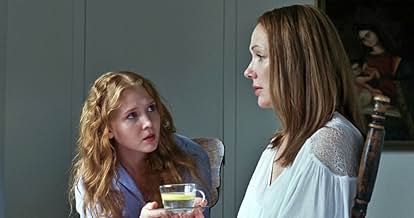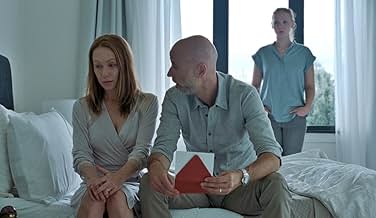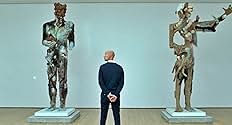PUNTUACIÓN EN IMDb
6,1/10
451
TU PUNTUACIÓN
Añade un argumento en tu idiomaA man begins having an extramarital affair to deal with his emotional and companionship needs while caring for his terminally ill wife.A man begins having an extramarital affair to deal with his emotional and companionship needs while caring for his terminally ill wife.A man begins having an extramarital affair to deal with his emotional and companionship needs while caring for his terminally ill wife.
- Premios
- 3 nominaciones en total
Anie Pascale
- Docteur Miller
- (as Anie-Pascale Robitaille)
Bruce La Bruce
- Premier ministre
- (as Bruce Labruce)
Roc Lafortune
- Maire
- (as Roc LaFortune)
Argumento
Reseña destacada
The films of Denis Côté definitely deserve a serious revaluation and greater exposure, whether in a movie theater or a window on your home computer, on general release or at a film festival: of his 14 feature films (4 documentaries and 10 fictions) I have only seen four titles and all of them were satisfactory works that captured me with their original proposals, based on stories that venture into unusual dramatic directions and very diaphanous audiovisual solutions, avoiding cheap effects and the dramaturgy of soap operas.
«Boris sans Béatrice» begins with a scene that is suddenly interrupted, but which, when revisited many minutes later, its conclusion is more of a metaphor than a turning point, more a trigger for our lazy mind than a piece of action that explains Boris, the protagonist. Standing in the middle of a field, Boris sees an approaching helicopter that, upon reaching him, remains several meters above earth, without descending, before Boris's expression of uncertainty.
Boris has decided to take a business leave. He's rich, handsome (German actor James Hyndman), has a beautiful country house and women at his disposal, he wears expensive casual-looking clothes, he drives his Mercedes through the countryside... but his wife Béatrice is almost catatonic. Something happens to her, nobody knows what, but Béatrice does not function as a beautiful spouse. We will later learn that she is a notable figure in Canadian politics, but not even the psychiatrist treating her can give a convincing diagnosis. Boris has decided to stay by her side, while he does and undoes at will: supported by his economic power, he goes against the local authority and against everything that cross his path to achieve any of his goals.
The adverse factors begin to manifest themselves when his daughter is arrested for participating in protests against the current world economic system. The differences between father and daughter are irreconcilable. On the same day that the girl leaves the country house (on foot, because her father refuses to give her a ride in his Mercedes), Boris receives an envelope in the mailbox, in which he is summoned at dusk in a lonely place, open sky. Someone mysterious (later identified as Monsieur Lewis) urges him to attend the appointment. Once there, in the middle of nowhere, the perpetually bizarre Denis Lavant arrives (he, from "Holy Motors", "Mauvais sang", "The Mountain" and almost a hundred titles, to which he was summoned for his great talent and his peculiar ugliness), and tells him, like a Tiresias of the third millennium, that it is he, Boris and only Boris, the cause of Béatrice's ills, and that, if he wants her to recover, he must change. At first, Boris ignores the advice and things turn against him, particularly his relationships with the women of his big bubble, such as his daughter, his mother, his lover, the girl who takes care of Béatrice, each for a different reason. Something must be done because the process is advancing towards a violent and exhausting point.
Sometimes, in my opinion, Côté becomes excessive in telling his fable of the rearrangement of elements in the microcosm of a ruthless man like Boris, as when M. Lewis becomes an omnipresent entity speaking in the dark through a speaker of unknown origin. However, each crisis is consistent with the filmmaker's universe, where normality is the alternation of the different planes of reality in his story. «Boris sans Béatrice» is highly recommended. Put aside 19th century dramaturgy for a while, and do not be afraid of novelty.
«Boris sans Béatrice» begins with a scene that is suddenly interrupted, but which, when revisited many minutes later, its conclusion is more of a metaphor than a turning point, more a trigger for our lazy mind than a piece of action that explains Boris, the protagonist. Standing in the middle of a field, Boris sees an approaching helicopter that, upon reaching him, remains several meters above earth, without descending, before Boris's expression of uncertainty.
Boris has decided to take a business leave. He's rich, handsome (German actor James Hyndman), has a beautiful country house and women at his disposal, he wears expensive casual-looking clothes, he drives his Mercedes through the countryside... but his wife Béatrice is almost catatonic. Something happens to her, nobody knows what, but Béatrice does not function as a beautiful spouse. We will later learn that she is a notable figure in Canadian politics, but not even the psychiatrist treating her can give a convincing diagnosis. Boris has decided to stay by her side, while he does and undoes at will: supported by his economic power, he goes against the local authority and against everything that cross his path to achieve any of his goals.
The adverse factors begin to manifest themselves when his daughter is arrested for participating in protests against the current world economic system. The differences between father and daughter are irreconcilable. On the same day that the girl leaves the country house (on foot, because her father refuses to give her a ride in his Mercedes), Boris receives an envelope in the mailbox, in which he is summoned at dusk in a lonely place, open sky. Someone mysterious (later identified as Monsieur Lewis) urges him to attend the appointment. Once there, in the middle of nowhere, the perpetually bizarre Denis Lavant arrives (he, from "Holy Motors", "Mauvais sang", "The Mountain" and almost a hundred titles, to which he was summoned for his great talent and his peculiar ugliness), and tells him, like a Tiresias of the third millennium, that it is he, Boris and only Boris, the cause of Béatrice's ills, and that, if he wants her to recover, he must change. At first, Boris ignores the advice and things turn against him, particularly his relationships with the women of his big bubble, such as his daughter, his mother, his lover, the girl who takes care of Béatrice, each for a different reason. Something must be done because the process is advancing towards a violent and exhausting point.
Sometimes, in my opinion, Côté becomes excessive in telling his fable of the rearrangement of elements in the microcosm of a ruthless man like Boris, as when M. Lewis becomes an omnipresent entity speaking in the dark through a speaker of unknown origin. However, each crisis is consistent with the filmmaker's universe, where normality is the alternation of the different planes of reality in his story. «Boris sans Béatrice» is highly recommended. Put aside 19th century dramaturgy for a while, and do not be afraid of novelty.
- EdgarST
- 13 ago 2021
- Enlace permanente
Selecciones populares
Inicia sesión para calificar y añadir a tu lista para recibir recomendaciones personalizadas
Detalles
- Duración1 hora 33 minutos
- Color
- Relación de aspecto
- 1.85 : 1
Contribuir a esta página
Sugerir un cambio o añadir el contenido que falta

Principal laguna de datos
By what name was Boris sin Béatrice (2016) officially released in India in English?
Responde































